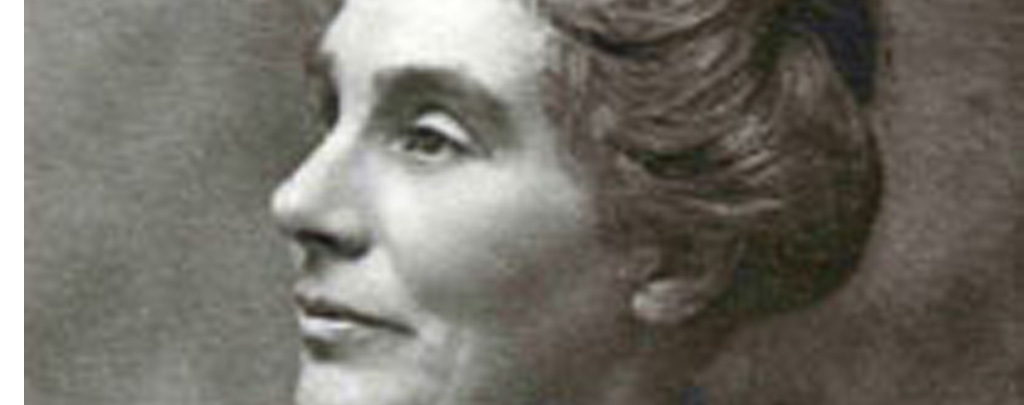
 |
WOMEN WORKING FOR PEACE |
||
THE MEN WHO SAID NO | ROAD TO CONSCRIPTION | CONSCIENTIOUS OBJECTION | PRISONS | SENTENCED TO DEATH | TRIBUNALS | WIDER CONTEXT | INDEX |
||
 |
||
| JOAN MARY FRY | WOMEN WORKING FOR PEACE | |
|
Joan Fry was involved with the No Conscription Fellowship, representing the Home Counties region on its National Committee during 1917, and she served as a Quaker prison chaplain helping the COs throughout the war. She was born on 27 July 1862 in London, the daughter of a judge, with six sisters including Ruth Fry, another pacifist campaigner and two brothers, one being Roger Fry, the art critic. Brought up in a large family of Quakers (eight generations of Quaker Frys), she lost an eye at the age of four in a nursery accident, and was heavily chaperoned as a girl and young woman as she involved herself in charitable work. She served as a Poor Law Guardian. In 1909 she moved to Guildford to look after her brother’s children. When the war began in 1914, she was over fifty, prominent in local government in Guildford, and recognised as the Quakers’ most effective woman speaker, with firmly held pacifist views. After conscription was introduced she became a Quaker prison chaplain, visiting conscientious objectors who were in prison. The Quaker Chaplains’ Committee was managed by Mrs. Percy Bigland, and included two women, Mabel Thompson and Joan Fry. Visiting the prisons they had to listen to up to 20 prisoners and were only allowed six minutes for each, usually with a guard listening. ‘So greatly did the CO’s…value their friendship that they would threaten to strike against prison rules if an attempt was made to limit their chaplains’ liberty.’ She bicycled hundreds of miles to attend their courts-martial, or to visit them in prison. Apparently at one detention barracks she found that ‘no woman, not even a cleaner, was allowed in. One man told me that just to see me there in the distance did him good.’ She upset the wardens by demanding to see the prisoners alone. One called the COs ‘your damned men’. She was at one point rebuffed from a military courtroom by a soldier with a fixed bayonet. It was Joan Fry who found Isaac Hall languishing in Pentonville prison, a Jamaican CO who had come to England just before the war and been unable to get home. He knew nothing about the causes of the war, and was a devout Christian believing in the commandment against killing. He had been very badly treated in prison and was seriously ill. Joan reported his position to the No Conscription Fellowship and Dr. Salter was able to visit. He went straight to the War Office and managed to secure his release, taking him home where he and Ada looked after him for nine months until they could get him a passage back to Jamaica. Joan Fry was often discouraged by the hostility she met in this work, but was even more depressed when she found that Guildford schoolchildren were being sent to work in local factories making airplane components. As part of the local Education committee she couldn’t endorse this support for the war, and resigned in protest. She sent a letter to Bertrand Russell in 1918 before he went to prison, which displays a little of her views: ‘To the cause of truth and freedom you have given of your best, and how good that best is may be measured by the hostility now shown to you. We dare not pity you, however sad we may be at what lies before you, since you could not but be a mark for enmity by the very nobility of your service.’ After the war she and other Quakers went to Germany to organise food relief for the population who were suffering due to the Allied blockade. She was the first English woman allowed into Germany after the war. They set up centres focusing on women and children and students, who were facing epidemics of consumption, child rickets and pneumonia. The Quaker post-war relief work earned them great respect in Germany. ‘As a gesture of fellowship, she insisted on speaking in German, however haltingly.’ Apparently when the wife of the head of the British Military Mission in Berlin arrived in a chauffeur-driven military car to be shown round the Quaker relief units in the city, she refused to use it, and instead took her in an old Ford marked with the Quaker star. She couldn’t be seen to have any association with the Army if she was to help the Germans in need. In the 1920s she started working to help the poor and unemployed in Britain, visiting coalfields and helping to start feeding centres for the children of unemployed miners, and through the Friends Allotment Committee, encouraging unemployed miners to grow vegetables on unused land. She died on 25 November 1955. Apparently George V wanted to honour her for her social work, but she refused to profit from other people’s misfortune. However she was honoured for her humanitarian work with a postage stamp in 2012 as one of ten Britons of Distinction.
|
|
|